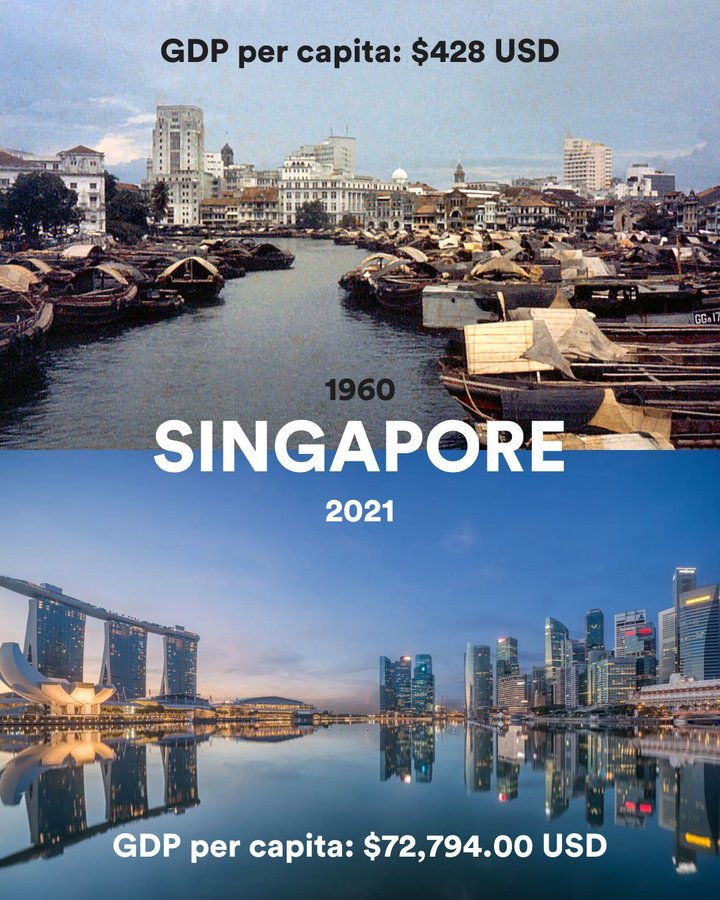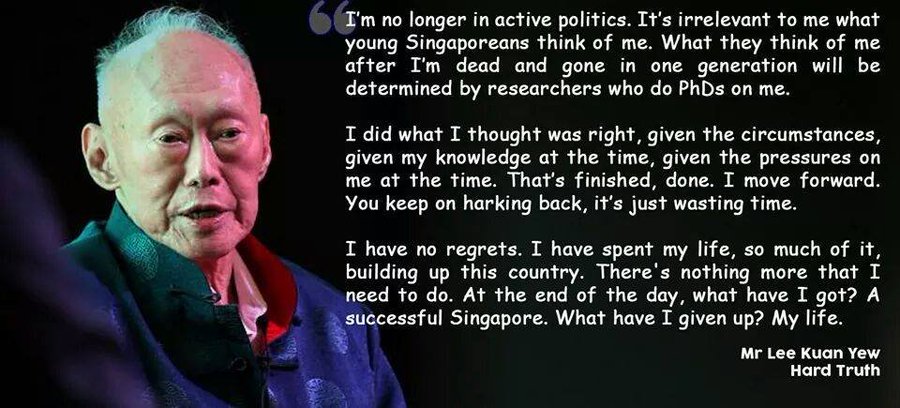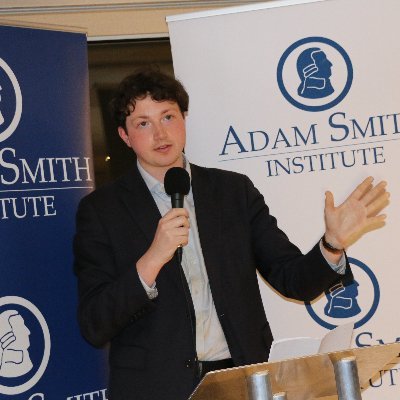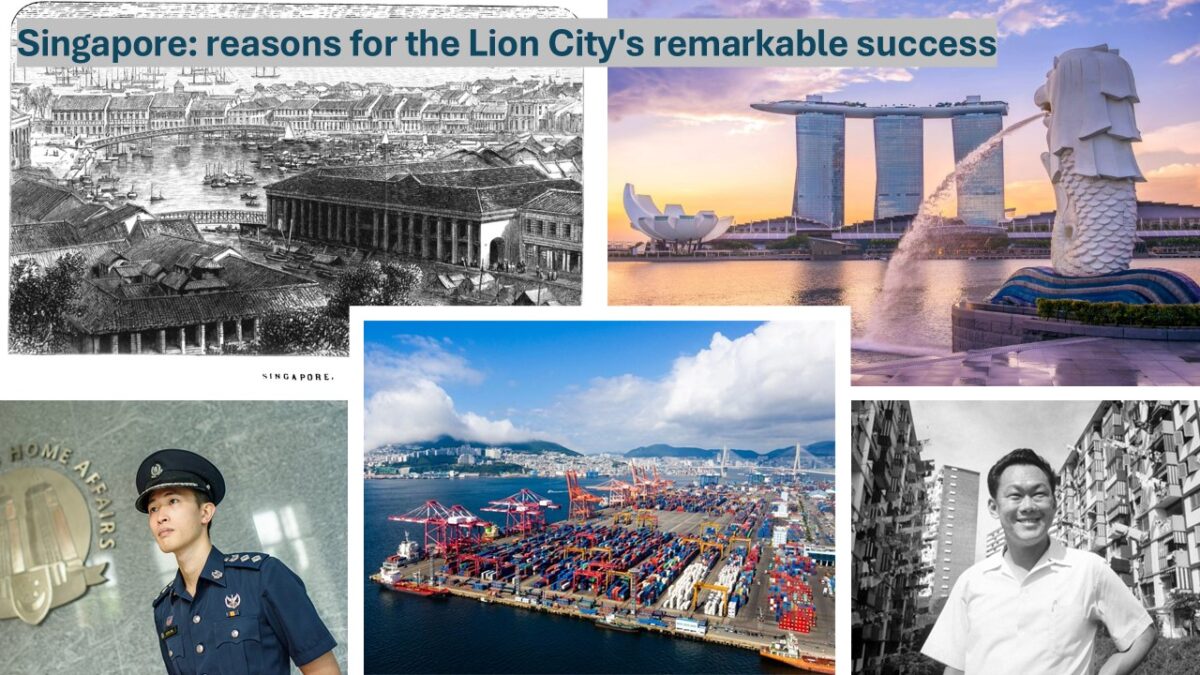Sam Bidwell writes on the success of Singapore.
“Singapore was born – a poor city state, surrounded by enemies, and with no natural resources of its own. Yet today, Singapore is one of the world’s richest and most successful nations”
Today, Singapore is: – the safest city in the world – the world’s freest economy – #1 in the Ease of Doing Business Index But why has Singapore been so successful, and why is it such a great place for businesses? A on the reasons for the Lion City’s remarkable success.
First, some history. In 1819, Singapore was founded by Sir Stamford Raffles, a British official who believed that the site was perfect for a trading post. The city grew quickly, attracting traders from across the region who were drawn to the city’s ‘free port’ status.
Singapore was governed by the British until 1963, when the city became independent as part of the ‘Federation of Malaya’. However, the union was not a harmonious one. Due to political disputes – including race riots in 1964 -, Singapore was expelled from Malaya in 1965.
And so, Singapore was born – a poor city state, surrounded by enemies, and with no natural resources of its own. Yet today, Singapore is one of the world’s richest and most successful nations, thanks largely to the work of its visionary founding father, Lee Kuan Yew.
A graduate of the University of Cambridge, Lee had initially tried to make a success of Singapore’s position within Malaya. But with independence forced upon him, he worked to build the ideal “start-up” nation in Singapore, using the city’s natural strengths to his advantage.
“Over 99 percent of all imports to Singapore are duty free. Corporation tax is charged at a flat rate of 17%, and the city has no capital gains tax.”
He was ruthlessly pragmatic in pursuit of his vision. His decisions were guided by empiricism rather than ideology. As a result, Singapore grew from an obscure post-colonial backwater into a world-leading city. What exactly did Lee do?

First, he recognised that Singapore’s openness to business and trade could be one of its greatest strengths. Over 99 percent of all imports to Singapore are duty free. Corporation tax is charged at a flat rate of 17%, and the city has no capital gains tax.
Thanks to efficient processes, it takes an average of 1.5 days to set up a business in Singapore, and just 15 minutes to register a company online. That’s alongside strong IP protections and light-touch regulation – many businesses have their Asia-Pacific hub in Singapore.
In order to make Singapore attractive to global businesses, Lee Kuan Yew insisted that English would be the main language of administration in the city. Alongside English, Singaporeans also learn a ‘mother tongue’ – Mandarin, Malay, or Tamil – depending on their heritage.
But low taxes and English proficiency alone would not be enough to guarantee Singapore’s success. The city also has world-leading infrastructure, designed with comfort and ease in mind. Singapore’s port is the second busiest in the world in terms of total shipping tonnage.
Meanwhile the city’s airport, Changi, is consistently rated as one of the best in the world. Changi Airport serves more than 100 airlines flying to more than 400 cities worldwide. It is clean, comfortable, and modern, designed to ensure efficient layovers and speedy boarding.
“One of the tragic illusions that many countries of the Third World entertain is the notion that politicians and civil servants can perform entrepreneurial functions.”
Within the city itself, travellers can get around using the fully automated Mass Rapid Transit network – a clean and comprehensive urban transit system, complete with functional Wi-Fi. Meanwhile the city’s roads are rated as amongst the best in the world.
Much of this infrastructure is funded and maintained by Temasek, an investment firm owned by the Singapore Government. Alongside GIC, Singapore’s other sovereign wealth fund, Temasek operates like a private company, managing many of the Government’s assets.
Temasek uses private sector incentives in the public interest. “One of the tragic illusions that many countries of the Third World entertain is the notion that politicians and civil servants can perform entrepreneurial functions.” – Dr Goh Keng Swee, 1st Finance Minister
Singapore also has a zero-tolerance approach to crime, with impartial and efficient enforcement of strict laws. Chewing gum is banned in the country, and littering can result in an on-the-spot fine. Vandalism and drug use can result in harsh penalties, including caning.
These laws, alongside an efficient system of municipal government, makes Singapore the world’s cleanest and safest city. Singaporeans regularly leave their phones as placeholders in public places – a civic culture of cleanliness and orderliness is extolled at every level.
Singapore also invests in its people and maintains genuinely meritocratic systems for hiring and firing. The Government consistently invests in education. At schools, at universities, and in public life, Singaporeans venerate intellectual ability and promote those who succeed.
Its political system is meritocratic too, prizing stability and talent. Though Singapore holds free multiparty elections, the Government maintains control over the political process. Protest is strictly controlled, and the press is regulated to prevent seditious acts and speech.
“Stability, low taxes, an efficient state, and an uncompromising approach to public order. These are the roots of Singapore’s success”
The result is the most stable political system in Asia, and amongst the most stable countries in the world. The People’s Action Party, founded by Lee Kuan Yew, has led Singapore since 1965, ensuring stability and continuity across the decades.
Public figures – civil servants and politicians – are paid well, to ensure that the best and brightest are attracted into Government. The Prime Minister of Singapore earns about ten times more than the UK’s Prime Minister, and about four times as much as the US President.
But Singapore also has a zero-tolerance approach to corruption. Public officials who take bribes while in office are removed from their post, fined, and often jailed. Just this week, the country’s former Transport Minister has been convicted of receiving gifts while in office.
Stability, low taxes, an efficient state, and an uncompromising approach to public order. These are the roots of Singapore’s success. In building Singapore, Lee Kuan Yew was not guided by ideology, but by what works. He was a pragmatic empiricist through and through.
Lee’s story is a reminder that national success is largely the product of pragmatism, competence, and vision. By studying what works in practice and implementing it, we can change society for the better. No obstacle is too big if we set our minds to the task of national revival.
The great man himself puts it best: The lessons of Singapore and Lee Kuan Yew should inspire us all.


Reproduced with kind permission of Sam Bidwell, Director of the Next Generation Centre at the Adam Smith Institute, Associate Fellow at the Henry Jackson Society, although views are his own. Sam can be found on X/Twitter, on Substack, and can be contacted at s.bidwell.gb@gmail.com. This article was originally published as a X/Twitter Thread at https://x.com/sam_bidwell/status/1839676939444875461?s=46.

